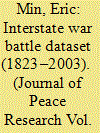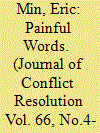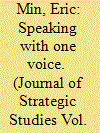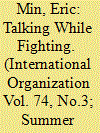|
|
|
Sort Order |
|
|
|
Items / Page
|
|
|
|
|
|
|
| Srl | Item |
| 1 |
ID:
178686


|
|
|
|
|
| Summary/Abstract |
Extant scholarship on interstate war and conflict resolution predominantly utilizes formal models, case studies, and statistical models with wars as the unit of analysis to assess the impact of battlefield activity on war duration and termination. As such, longstanding views of war have not been tested systematically using intraconflict measures, and deeper studies of war dynamics have also been hampered. I address these gaps by creating and introducing the Interstate War Battle (IWB) dataset, which captures the outcomes and dates of 1,708 battles across 97 interstate wars since 1823. This article describes the sources used to create these data, provides definitions, and presents descriptive statistics for the basic battle data and several daily-level measures constructed from them. I then use the data to test the implications of two major theoretical perspectives on conflict termination: the informational view, which emphasizes convergence in beliefs through battlefield activity; and Zartman’s ripeness theory, which highlights costly stalemates in fighting. I find suggestive evidence for informational views and little support for ripeness theory: new battlefield outcomes promote negotiated settlements, while battlefield stagnation undermines them. The IWB dataset has significant implications, highlights future research topics, and motivates a renewed research agenda on the empirical study of conflict.
|
|
|
|
|
|
|
|
|
|
|
|
|
|
|
|
| 2 |
ID:
186320


|
|
|
|
|
| Summary/Abstract |
How does battlefield activity affect belligerents’ behavior during wartime negotiations? While scholars have studied when and why warring parties choose to negotiate, few insights explain what negotiators do once seated at the table. I argue that actors engage in obstinate negotiation behavior to signal resolve when undergoing contentious and indeterminate hostilities. I explore this claim by analyzing all negotiation transcripts and associated daily military operations reports from the Korean War. Using text-based, machine learning, and statistical methods, I show that high levels of movement or casualties in isolation produce clear information on future trends, thus yielding more substantive negotiations, while more turbulent activity featuring high movement and casualties in tandem produces cynical negotiations. Moving past contemporary literature, this study explores micro-level dynamics of conflict and diplomacy, builds a theoretical bridge between two perennial views of negotiation, and provides a framework for studying war by applying computational methods to archival documents.
|
|
|
|
|
|
|
|
|
|
|
|
|
|
|
|
| 3 |
ID:
186095


|
|
|
|
|
| Summary/Abstract |
When and why do countries in a wartime coalition engage in diplomacy during hostilities? This paper establishes a theoretical framework of coalitional diplomacy that highlights each member’s private costs and benefits to fighting or seeking a negotiated exit. I argue that the propensity for coalition members to engage in negotiations is a function of the coalition’s balance of military contributions, as well as the coalition’s battlefield successes and failures. Evidence supporting these claims stem from a large-scale quantitative analysis of two centuries of interstate wars, as well as a close study of the Allies in the Crimean War.
|
|
|
|
|
|
|
|
|
|
|
|
|
|
|
|
| 4 |
ID:
172835


|
|
|
|
|
| Summary/Abstract |
Contemporary studies of conflict have adopted approaches that minimize the importance of negotiation during war or treat it as a constant and mechanical activity. This is strongly related to the lack of systematic data that track and illustrate the complex nature of wartime diplomacy. I address these issues by creating and exploring a new daily-level data set of negotiations in all interstate wars from 1816 to the present. I find strong indications that post-1945 wars feature more frequent negotiations and that these negotiations are far less predictive of war termination. Evidence suggests that increased international pressures for peace and stability after World War II, especially emanating from nuclear weapons and international alliances, account for this trend. These original data and insights establish a dynamic research agenda that enables a more policy-relevant study of conflict management, highlights a historical angle to conflict resolution, and speaks to the utility of viewing diplomacy as an essential dimension to understanding war.
|
|
|
|
|
|
|
|
|
|
|
|
|
|
|
|
|
|
|
|
|